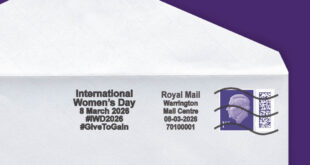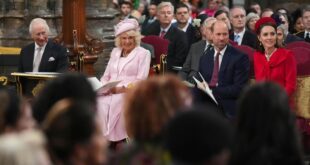Charles’s official insignia, known as a cipher, “was selected by His Majesty from a series of designs,” according to a statement from Buckingham Palace.
The personalized sovereign seal was prepared by the College of Arms, established in 1484, an ancient body responsible for managing official registers of coats of arms and pedigrees.
Since the death of the queen this month, no formal time frame has been announced for the replacement of royal insignia. However, the palace said Tuesday that “the process will be gradual” and that it would leave the decision to replace ciphers “at the discretion of individual organisations.”
A spokesperson for the government’s cabinet office told The Washington Post on Tuesday: “Where changes can be made easily, such as digital branding, they can be made immediately. Physical items such as signage or stationery will be replaced gradually over time as the need arises.”
On Tuesday, the Court Post Office at Buckingham Palace “franked,” or stamped, the first items of mail with the new monarch’s cipher using black ink in a historic first.
Invitations, responses to public letters, state business and, famously, telegrams to Britons who celebrate the milestone of their 100th birthday are among the average 200,000 items of mail handled each year by Buckingham Palace’s post room.
The use of ciphers can be traced back to Tudor times, according to the Royal Mint, which is responsible for making Britain’s coins. From the reign of Henry VIII onward the letter “R” was added to the monarch’s first initial as a prestigious identifying mark.
The queen’s well-known cipher “EIIR” which stands for Elizabeth Regina (Latin for queen), remains a common sight in many places. However, in Scotland, the adoption of her cipher in public spaces has been resisted at times, with mailboxes occasionally vandalized. Queen Elizabeth I never technically ruled Scotland, leading some to argue Queen Elizabeth II could not be the second queen of Scotland — and rejecting her insignia. A Scottish version of Charles’s cipher will also differ slightly and feature a Scottish crown, the palace said.
“The Monarch is allowed to choose the crown in the cypher. King Charles III appears to have chosen what’s known as the Imperial State Crown, as George VI, George V and Edward VII did before him,” Chris Taft, head of collections at the Postal Museum, wrote to The Post, using the British spelling for cipher. “There are no strict rules in cypher design so the crown’s design can be tweaked. Queen Elizabeth II selected the St. Edwards Crown,” he added.
The Royal Mint said in a statement Tuesday that coins featuring the king’s portrait will enter circulation but that coins “bearing the effigy of Her Late Majesty Queen Elizabeth II will also remain legal tender and in active circulation.” Coins featuring different monarchs historically “co-circulate,” it added, ensuring a “smooth transition, with minimal environmental impact and cost.”
It gave no date for the release of a new coin but said further details would be unveiled over “the coming weeks.”
“As official coin maker to the U.K., we have told the story of each monarch since Alfred the Great and are now preparing for the biggest change in British coinage for several decades,” said Anne Jessopp, head of the Royal Mint. “The first coins bearing the effigy of His Majesty King Charles III will enter circulation in line with demand from banks and post offices.”
The Bank of England also said Tuesday that it would reveal images of updated bank notes featuring a portrait of the king “by the end of this year,” with the notes expected to enter circulation by mid-2024.
Elizabeth still appears on all coins and bank notes, in portraits updated five times during her reign. There are approximately 27 billion coins circulating in the U.K. bearing her portrait. Images of the monarch on bank notes are a more recent invention — only since 1960 has the British sovereign featured on them, giving the queen a “unique distinction,” according to the palace.
In a quirky tradition that has endured over 300 years on coins, each new monarch flips to face the opposite direction to their predecessor. The only exception to this was during the brief reign of Edward VIII, who preferred portraits of himself facing left.
The queen’s father, George VI, faced left on his coins, Elizabeth faces right, and it is expected that Charles will face left.
The queen also features on British stamps. On Tuesday, the Royal Mail is releasing four new stamps in her memory to go on sale from Nov. 10.
“Today we are unveiling these stamps, the first to be approved by His Majesty The King, in tribute to a woman whose commitment to public service and duty was unparalleled in the history of this country,” said Simon Thompson, chief executive of Royal Mail.
Their ancestor, Charles I, was the first to open the royal postal service to public use in 1635 to raise funds. The postal system rapidly expanded during Queen Victoria’s reign with the introduction of cheap stamps leading to the “penny post.” The iconic bright red pillar boxes bearing Elizabeth’s royal cipher will probably remain for decades to come, with new post boxes bearing Charles’s cipher being rolled out alongside.
Source link



